#british culture
Text
I understand the choice to change the original use of the word “fag” to “drudge,” for obvious slur reasons. But, by doing that, you’re ensuring that viewers won’t know that fagging was an actual practice that’s been around for centuries in Great Britain.
It clearly wasn’t a humane or ethical system, and it’s deeply frowned upon in present day. But it was a huge part of British public/boarding school culture, and “fag” and “fagging” were the words exclusively used for this practice.
There’s even a possibility that the modern gay slur “faggot” was derived from this practice, since fagging frequently involved physical and sexual abuse between students. However, tellingly, fagging became less popular in some schools when homosexuality was more actively criminalized.
All that is to say that—though I get the reasoning—you’re still erasing a plot-relevant part of history by glossing over this very bad, very true thing that existed in England (and in some English colonies!) up through the 20th century. The truth is ugly, but it’s better context for the story you’re telling, and quite honestly makes Ciel’s situation at Weston make a lot more sense.
#black butler#kuroshitsuji#ciel phantomhive#sebastian michaelis#cloverworks really said ‘this series is controversial enough without us using the f-slur every 3 minutes’#and like I GET IT!!! but there’s literally no other word that applies historically#and the system is being used as an active plot point in the story!! but PR is a mighty big thing to consider i guess#weston college arc#english history#boarding schools#uk history#british history#british culture#f slur#drudges#neo queen serenity’s posts#black butler season 4#black butler public school arc#kuroshitsuji season 4
23 notes
·
View notes
Text
How to awaken British kids from the 2000s/2010s:
MY NAME IS, MY NAME IS, MY NAME IS CHARLES THE SECOND-
#british culture#british childhood#2000s nostalgia#2010s nostalgia#horrible histories#charles ii of england#matthew baynton#childhood nostalgia#nostalgic songs
65 notes
·
View notes
Text
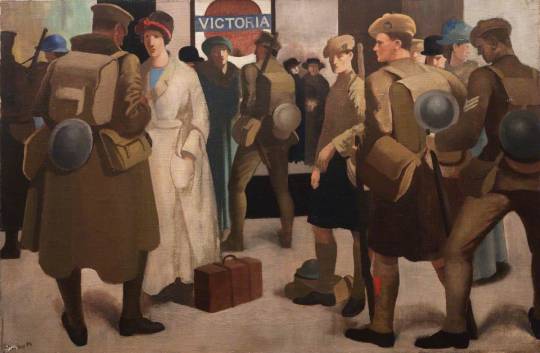
Bernard Meninsky (British/Ukrainian,1891–1950) • Victoria Station, District Railway IWM • 1918 • Imperial War Museums, UK
#art#painting#fine art#art history#bernard meninsky#british/ukrainian artist#war history#british culture#genre scene#history painting#early 20th century british art#artwork#ww i#pagan sphinx art blog#art lovers on tumblr#art blogs on tumblr#oil painting
63 notes
·
View notes
Text
USAmericans will literally live in a trailer working 3 jobs for $7 an hour surviving off gas station food and still call themselves ‘middle class.’
Here in the UK if you’re middle class you’re probably a neurosurgeon with a stable-barn and a mansion big enough to have its own name. US middle class is our working class.
Not got owt to say about it, just really fuckin weird innit. I’ve had a few USAmericans describe me as middle class and I’m like mate… I make half of what you do lol
EDIT: I have since been corrected on this!!! Please stop reblogging this without checking the notes first, I was quite wrong!!!
#class divide#class differences#classism#british culture#uk culture#american culture#uk politics#british politics#america politics#us politics#working class#poverty#middle class
113 notes
·
View notes
Text
Whenever Brits are like "tea is our national drink, our culture, our personality, our mental health" I think of our hill country blanketed in a patchwork quilt of human suffering and ongoing violent colonialism and want to smash all their tea cups. Your genocidal leaf juice is nothing to be proud of. The present day tea pluckers are the descendants of the Indians you enslaved and they still live in unthinkable poverty in the line houses you built to house them like cattle. The families whose farmlands you robbed have been starving for generations. Every sip of your leaf juice is soaked in blood and you drink it like vampires.
Tea will never belong to you. It's our legacy of grief, and your shame.

Drink your tea and shut the fuck up.
#sri lanka#'but my parents were immigrants!' 'and you're living in a genocidal country that's still sucking the marrow from the global south. so.'#'but my parents were indians!' 'ok? drink your chai and think about the stateless south indian tea pluckers? what is your point?'#if you live in britain you enjoy the fruits of its empire even if you're at the bottom of the food chain#that's why middle class Asians and Africans migrate to europe even if it means they have to earn a living on minimum wage#you can't share a race and country with sue braverman and tell me that your origins can make you any less complicit#british culture#tea#british empire#colonialism#british colonialism#colonization#extractive colonialism#tourism#capitalism#indigenous rights#indian ocean slavery#slavery#white supremacy#knee of huss#food culture#cash crops#monoagriculture#ecocide
47 notes
·
View notes
Text
I wonder what had british culture would have looked like if Shakespeare was imprisoned and forbidden to write.
If Chaucer was tortured to death before he made it to his 40
If Orwell rotted away in a concentration camp
If the entire generation of beatniks was executed
If Britain existed behind the iron wall, and noone outside had a slightest clue about what's happening with the people inside
It's hard to imagine what the would would have looked like then. But I know for sure that people would be blabbing about how brits are just naturally culturally inferior and never contributed anything for the humanity
#ukraine#ukrainian culture#ussr#great britain#british culture#literature#ukrainian culture is great. the reason why you don't hear about it is not because it's worse than others
457 notes
·
View notes
Text
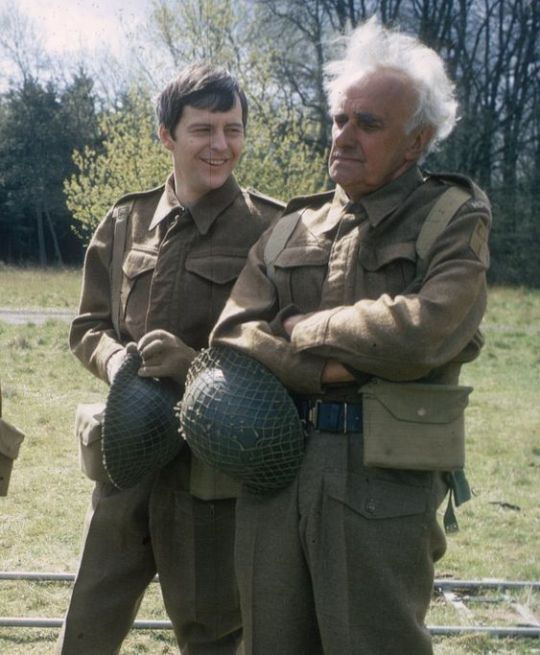
A little more on Ian Lavender, who passed away February 2nd, 2024, aged 77.
Just one of the abiding friendships between the cast of Dad’s Army was between Ian Lavender himself (born 1946) and John Laurie (born 1897).
Private Pike was Ian Lavender’s first ongoing television role, while John Laurie, a Great War veteran, had appeared in British films dating back to 1929, and was a leading Shakespearean actor on stage.
John Laurie was godfather to Ian Lavender’s children, and they were both dab hands at The Times crossword. John Laurie passed away in 1980, at the age of 83.

Ian Lavender always expressed his gratitude for having worked on Dad's Army, but admitted that typecasting had held back his career, particularly in movies, although he did appear in a handful of classic mid-seventies British films, including Carry on Behind, Not Now, Comrade, and Confessions of a Pop Performer.
He reprised his Dad's Army character, Frank Pike, in a BBC radio sequel, It Sticks Out Half a Mile, and he starred alongside Mollie Sugden in one of David Croft's rare catastrophes, the sci-fi sitcom Come Back Mrs Noah. He featured with Jimmy Edwards in The Glums, and had a series of memorable cameos on British television, including in Yes Minister, Goodnight Sweetheart, and Keeping Up Appearances.
According to his obituary in The Guardian:
"...In addition to various live Dad’s Army productions, his stage work included the Peter Hall Company’s The Merchant of Venice, with Dustin Hoffman as Shylock in 1989, touring as the Narrator in The Rocky Horror Show in 2005, Monsignor Howard in the London Palladium production of the musical Sister Act in 2009, The Shawshank Redemption at the Edinburgh fringe in 2013, and his own one-man show of reminiscences, Don’t Tell Him, Pike..."
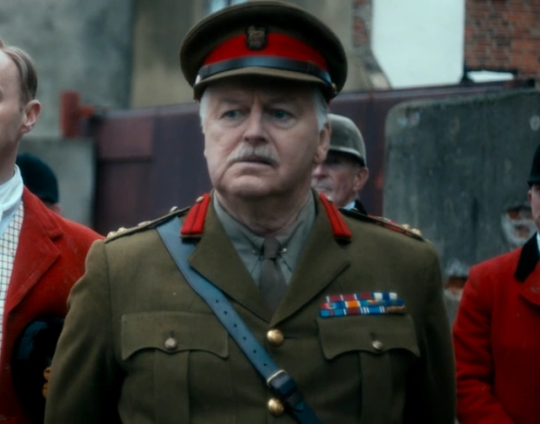
He appeared in 245 episodes of Eastenders, and was one of only two of the original Dad's Army cast members, along with Frank Williams (the Vicar), to appear in the 2016 feature film.
Here Ian Lavender recalls an unintentionally comical appearance on New Zealand radio some years after the final episode of Dad's Army.
#social history#ian lavender#dads army#british culture#british television#british theatre#british actors#classic television#yes minister#keeping up appearances#david croft#bbc radio#eastenders
25 notes
·
View notes
Text
Question for the brit’sh folks: I was thinking about hogwart houses and their value systems and about how JK shows her bias towards these value systems. She holds Gryffindor values in very high regard but seems to look down on Slytherin. One of her biggest issues seems to be that of the ambition trait. Ambition is almost always portrayed as a negative quality to the point that those who aren’t even in Slytherin with this trait are treated quite poorly by the narrative (Percy you deserve better).
I’ll admit right now that I don’t truly understand the class system in the UK. (I’ve found myself asking “wait what jobs do the Malfoys and Blacks even have? Where is this money coming from” And then I have to remind myself that they’re old money aristocrats types). I’ve made attempts to get it but I’m still a bit perplexed. So as an American reader some things in the series completely went over my head and I’ve had to have them be pointed out for me to even notice them (thank you Snape meta writers!).
As an American reader it is a little strange that ambition is held in such contempt in this series. The whole thing about America is to try to do better than your parents did, to move up in life, to pull yourself up by your bootstraps and achieve that American dream! So when you start analyzing the series with that perspective it is a bit puzzling.
So I guess my questions are: Is JKR’s aversion to ambition a “her problem” or is this a general view that the British class structure encourages. Or to put it a different way, does British society look down upon upwards economic mobility? And if so what are other ways this is reflected in the series?
For a more general question: Is the idea of the American dream in contrast with traditional British values? If so, what do these culture clashes look like?
(Also I’m not asking if you personally as a British citizen have a problem with ambition but more trying to understand UK culture and society)
#this is giving sophomore English class#im expecting a 5 paragraph essay in MLA format on my desk by Tuesday or else we’re not watching great gatsby (2013) on Friday!#guys I’m sorry#someone let me know if I sound stupid#I’m trying!#I just feel like as an American it’s kinda hard to really understand british classism because it seems pretty different than the classism -#we have over here#hp meta#harry potter fandom#harry potter meta#hp#harry potter#gryffindor#slytherin#wizarding world#britain#british culture#uk#percy weasley#snapedom#pro snape#hogwarts houses
90 notes
·
View notes
Text
Seeing Lou and Siobhan fight over whether raspberry mustard or grape jelly is more weird is so funny because I have never heard of either of these things.
This season is just The Most cultural study into both American culture and British culture, because this is like the fifth thing to come up this season where Siobhan is weirded out by American culture and the others are in return weirded out by whatever British thing Siobhan brings up to counter and I am just sitting there, weirded out by both but also deeply fascinated by them.
#Adventuring Party#Fantasy High Junior Year#American Culture#British Culture#Food#it's wild though because I spent... all my life#watching American movies and TV shows#many set in high schools. yet I feel like THIS is#the most Deep Dive into American high school culture??#and it UTTERLY FASCINATING#and also disturbing and confusing and unsettling
22 notes
·
View notes
Text
8 notes
·
View notes
Text
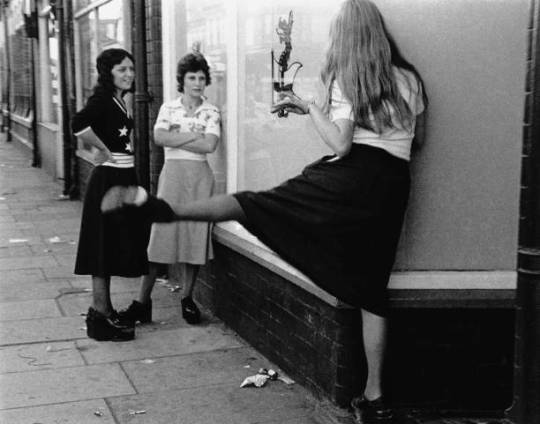
England, Merseyside
England, Merseyside, Bootle, Young girls in street playing with their reflections in shop window, 1975. (Photo by: Dave Fobister/Eye Ubiquitous/Universal Images Group via Getty Images)
#1970s#1970s fashion#mod#england#britain#british fashion#british culture#seventies#1970s culture#photography#street photography#urban photography#street
7 notes
·
View notes
Text
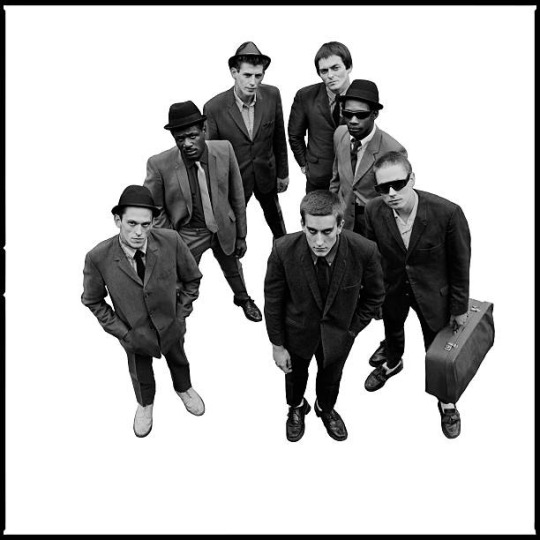
the specials photographed by chalkie davies, 1979.
#the specials#terry hall#1979#chalkie davies#black and white#ska#two tone#jerry dammers#lynval golding#horace panter#neville staple#john bradbury#roddy radiation#1970s#70s music#british music#british culture#ghost town
128 notes
·
View notes
Text
KJ Charles has breathtaking range. And it's all so organically diverse and vivid and excellently paced and clever.
Doomsday books -- Smugglers of Romney Marsh in 1810–20s in the wake of the Napoleonic Wars.
Society of Gentlemen -- Clash between the royalist establishment and radical republicans in the last years of Regency.
Sins of the Cities -- Small businesses and trade of the Industrial Revolution in London's immigrant quarter (taxidermy of all things!), Victorian spiritualists and musical hall artists in the 1870s.
Lillywhite Boys -- London criminal underworld, bluestocking feminists, private detectives, colonial gem trade, the rise of industrialists in the 1890s, and pre-Victorian folk Christmas traditions.
Charm of Magpies -- Shanghai traders and Chinese immigrant communities of London in the late 1800s.
England World -- Nascent British intelligence agencies and new technology in the shadow of the Boer War in the 1890s + integration of Indian nobles from its last kingdoms with elite British society + classism and xenophobia in British antisemitism
Will Darling Adventures -- The reverberating social, political and economic changes from the aftermath of WWI and further development of intelligence organisations during the 1920s.
Just finished Band Sinister, which touched on Hellfire Clubs, the emergence of new medicine, atheism, and challenge Creationism from the fields of natural science, and Black British life before abolition. Currently reading Unfit to Print, which seems to be about London's underground pornography trade with character focus on the shared plight of Black and Indian immigrants from the colonies and their mixed race offspring. Charles's body of work really brings home that the 19th century was a full hundred years long and the distinct character of every decade. And that the real and authentic history of Britain had people of every race, religion, colour, disability, neurodiversity, gender and sexuality who have been deliberately erased by the same power structures that kept them disenfranchised and ghettoed back then.
#british history#british culture#black britain#british immigrants#british colonialism#historical fiction#queer history#queer historical fiction#queer historical romance#mlm romance#kj charles#book recs#book recommendations#knee of huss
24 notes
·
View notes
Text
WE NEED A SHAUN THE SHEEP/WALLACE AND GROMIT/CHICKEN RUN CROSSOVER
These three cinematic masterpieces have these things in common:
A resourceful, intelligent animal main protagonist.
All the humans (apart from the main antagonists) are very stupid.
All three are absolute ICONS of British culture.
The main protagonist has an amazing but very stupid friend (the dopey sheep, Wallace, Babs)(and I get Wallace is an inventor but growing rabbit ears wasn't a hint to him that he might be the were rabbit in the last film)
And I think the explanation as why humans in Shaun the sheep only talk in garble could be because the sheep can't understand what the humans say like chickens and dogs can.
Imagine how AMAZING this crossover would be? The main antagonists of all three franchises teaming up to start a new threat that our animal heroes can only defeat together.
AARDMAN STUDIOS MAKE IT HAPPEN IM BEGGING YOU
#shaun the sheep#wallace and gromit#chicken run#movies#crossover#cinema#britain#british culture#britain forever#babs#chicken run: dawn of the nugget#wallace#gromit#aardman
16 notes
·
View notes
Text
#requested#language poll#poll blog#random polls#silly polls#stupid polls#polls#silly poll#tumblr polls#poll#pick one#this or that#chips#crisps#potato chips#potato crisps#snacks#food poll#english poll#english language#american english#british english#languages#english langblr#word poll#words#american culture#british culture#american food#british food
5 notes
·
View notes
Text
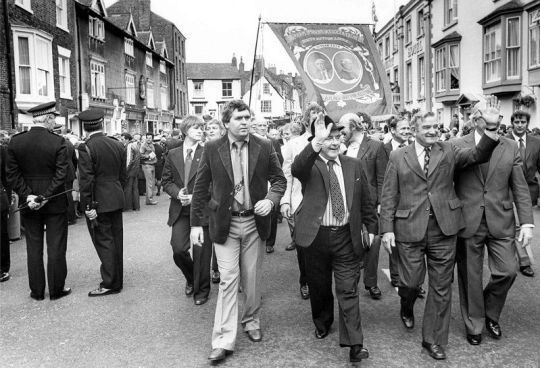

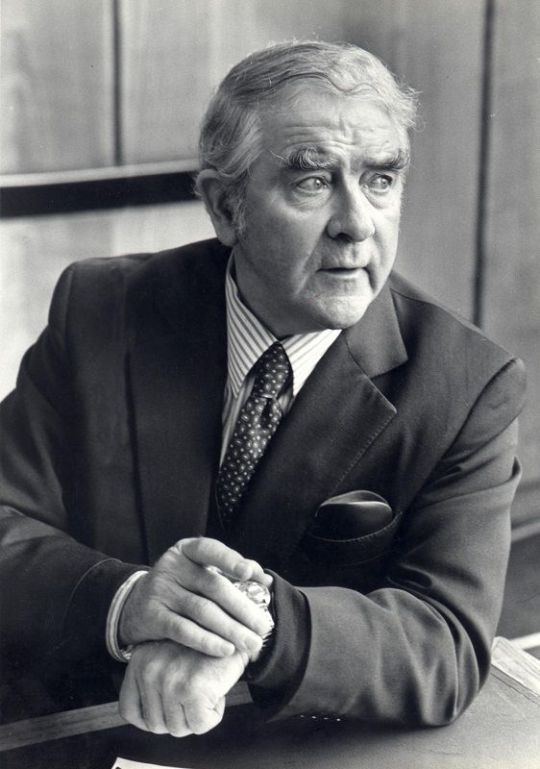
On February 18th, 1981, a BBC headline announced something that would be unthinkable three years later, 'Thatcher Gives in to Miners'.
"…Mrs Thatcher's Conservative Government has withdrawn plans to close 23 pits in its first major u-turn since coming to power two years ago. President of the National Union of Mineworkers Joe Gormley is confident the government's intervention will avert the threatened national miners' strikes…"
After crisis talks in Whitehall between union leaders and Energy Secretary, David Howell, the government agreed to reduce coal imports from eight million to 5.5 million tons and to reinstate higher operating subsidies.
NUM President Joe Gormley stated that as a result of commitments given, he would not be recommending a strike despite overwhelming support for industrial action from within the union membership.
Not everyone was happy;
"…The next day the NUM told all miners to return to work after the executive voted to accept the concessions made by the government and coal board by 15 to 8, with one abstention. Some left-wing pits maintained unofficial stoppages and there were pickets outside the NUM headquarters in London…"
When the government confirmed an injection of 300 million pounds in industry support, the unofficial action was called off and rebel pits were operating again by 20th February. Just over a year later, Joe Gormley secured a 9.3 % pay rise for miners, and was replaced by Arthur Scargill as NUM President.
In a 2002 BBC documentary, a former Special Branch officer claimed that Joe Gormley was a security services informant during the 1970s, having become concerned over the increasing influence within the NUM of left-wing militants.
Arthur Scargill opined,
"…The history of our movement is littered with people in leadership positions who were either connected with Special Branch or connected with the State..."
Joe Gormley was awarded a Life Peerage in 1982, and passed away in 1993.
#social history#uk politics#working class history#social justice#modern history#uk government#british culture#society#uk history#coal mining#coal industry#industrial action#trade unions
25 notes
·
View notes